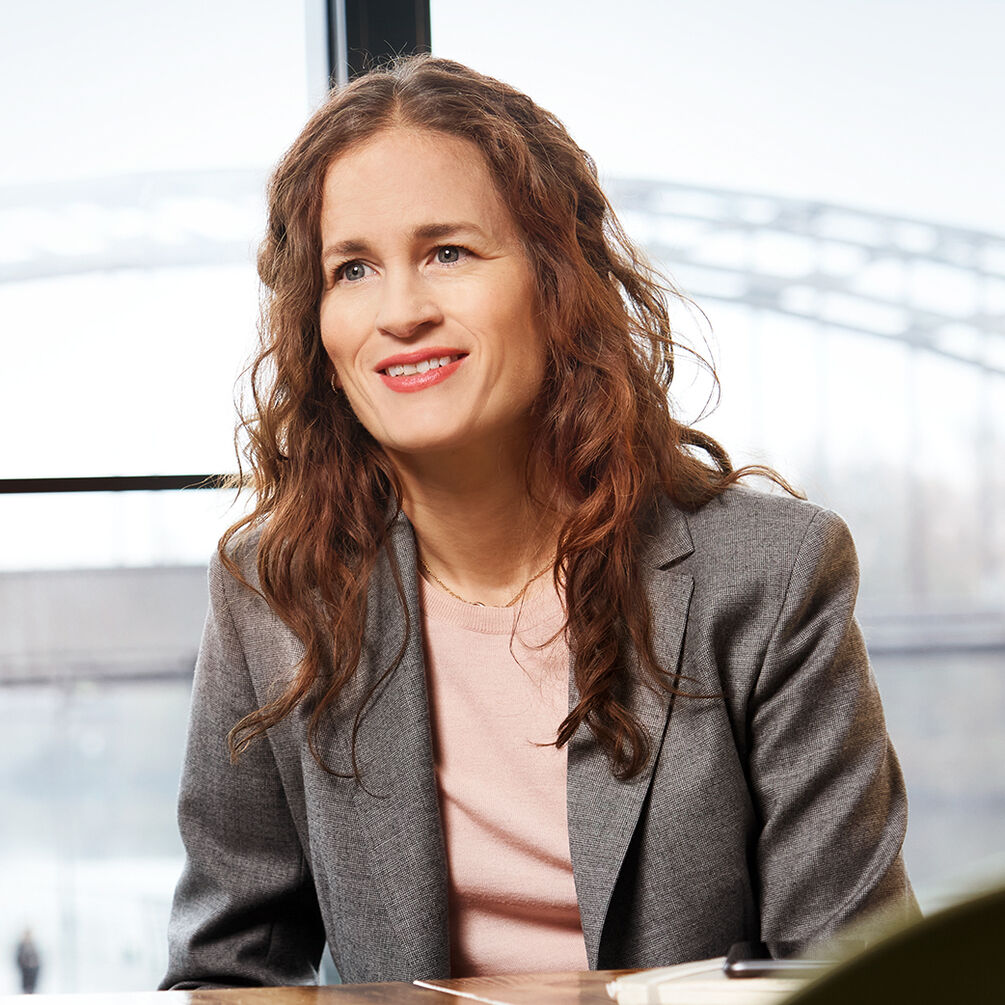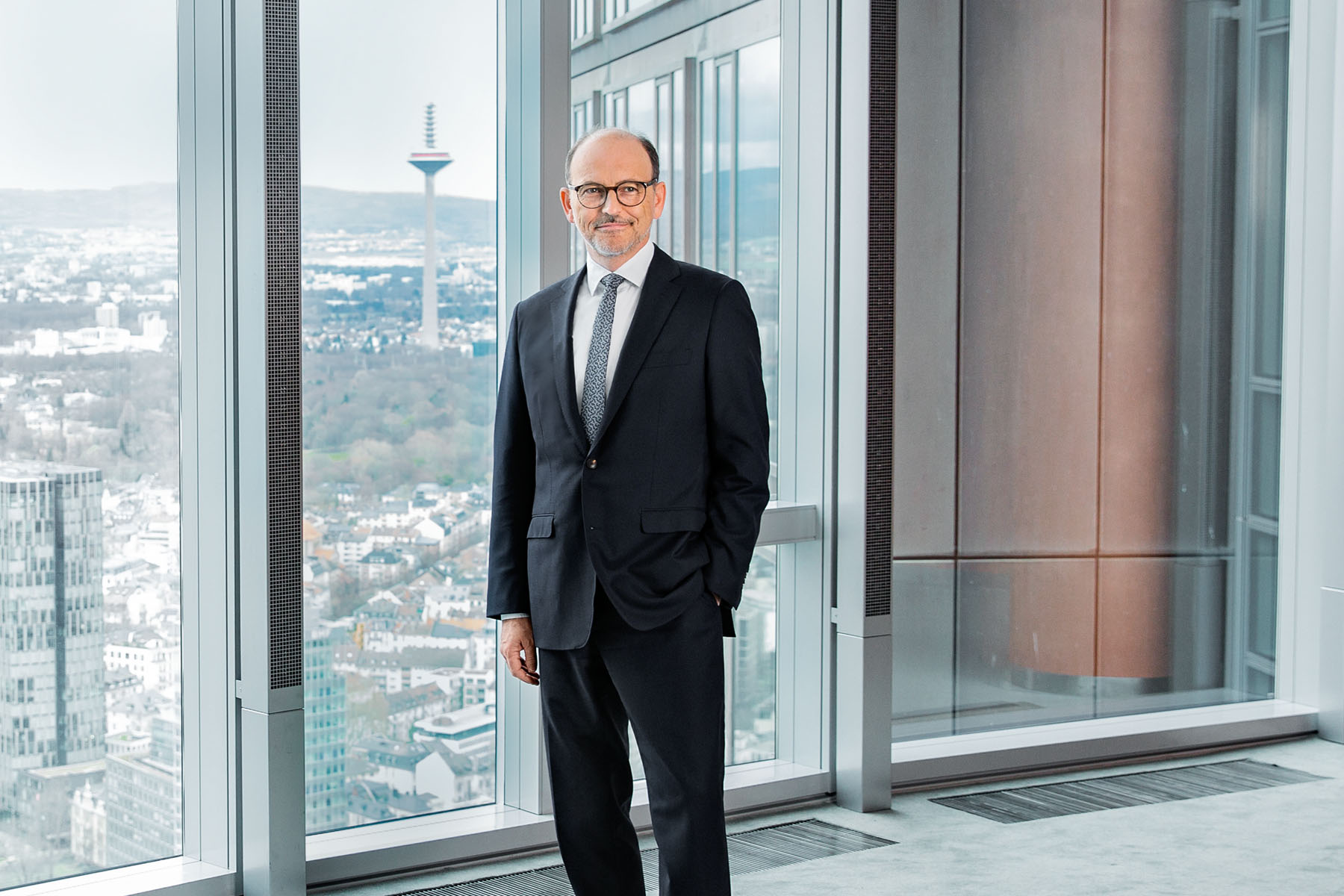Gaining an edge through diversity
Interview with CEO Thomas Groß
The importance of sustainability and sustainable financing solutions has increased markedly over the last few years. Has the pandemic pushed these topics back into the shadows somewhat?
Not at all. Sustainability remains the next big challenge for credit institutions after the wave of new regulations, the current period of ultra-low interest rates and digitalisation. Sustainability, after all, affects all of the main areas of a bank, from operating business to internal processes and structures. We undoubtedly have an advantage here because sustainability has always been hard-wired into the Bank's DNA.
Helaba has successfully positioned itself as a specialist for sustainable financial products, most notably in respect of green promissory notes in the real estate and energy sectors. Social and political pressure continues to grow, however, with the EU, for example, aiming to achieve climate neutrality and a circular economy by 2050, and I consequently expect demand for sustainable financing solutions to exceed supply by a significant margin for the foreseeable future.
How does Helaba intend to meet this challenge?
We have created the new post of Chief Sustainability Officer, a role we filled internally with the appointment of Petra Sandner, to pool opportunities across the whole of the Helaba Group. Ms. Sandner's remit also includes HelabaSustained, a programme that is going to help us substantially improve our ability to support customers with sustainable financial products. Proceeding jointly with all our subsidiaries, we are defining the strategic objectives for Helaba's sustainability management activities across the whole of the Group and working out what steps we need to take as a result.
Sustainable finance and the alignment of our product portfolio are of course a particular priority. Just as important as the ideas we decide to pursue on the operational side is our capacity to adapt our corporate culture to match. I am thinking here of sustainable HR management and the related issue of the diversity of our workforce. The more we do to incorporate and actively build up diversity, the more successful we will be, both as an employer and as a reliable partner in a more sustainable economy. I'm absolutely certain of this.
„We need specific actions and objectives to speed up the process to ensure our organisation is truly diverse.“
Thomas Groß
 Three questions for Petra Sandner
Three questions for Petra SandnerThree questions for Petra Sandner
„Sustainability is not a fleeting trend“ says Petra Sandner, Chief Sustainability Officer of the Helaba Group.
 Green Bonds
Green BondsGreen Bonds
Sustainable issuance of Helaba – three questions to Helaba experts Dirk Mewesen and Petra Sandner
Sustainability
Promoting the common good and protecting the natural foundations of life is a corporate obligation for us.
The financial sector remains a strongly male-dominated environment, especially at the uppermost levels. The public clamour for diversity and equality of opportunity grows stronger all the time …
These calls for change are entirely justified in my opinion. Let me say, first of all, that we have a holistic approach to sustainability and prioritise all the ESG criteria including fair corporate governance and social responsibility as well as climate protection. And promoting diversity – or, looking at it the other way around, preventing discrimination – clearly falls under the heading of social responsibility. One company on its own cannot hope to solve what is really a task for the whole of society, but we can certainly play our part and set a good example.
We have accordingly signed the Diversity Charter and adopted a mandatory code of conduct that prohibits all forms of discrimination. The use of gender-neutral language has already been standard procedure at Helaba for quite some time. My personal view, though, is that we still need specific actions and objectives to speed up the process and ensure our organisation is truly diverse in practice as well as on paper.
What specific actions do you have in mind?
The area in which we undoubtedly have most scope to make a difference is our HR work. We have set ourselves the target of having women in 30 percent of our management positions and are implementing corresponding requirements in our applications processes and in succession planning to help us make it happen. Life-stage models are another key element. We have also developed an empowerment programme of seminars and mentoring opportunities specifically for women to help our female staff chart their next steps and actively plan their career.
We have this focus on promoting women because they represent the biggest group, but ultimately what I am interested in is a sustainable corporate culture in which everyone genuinely feels they can achieve what they want to achieve provided they are sufficiently motivated and put in the necessary effort. And I do mean everyone, regardless of gender or age, disability, nationality or ethnic origin, parental responsibilities, religion, ideology or sexual orientation.
 Out of conviction
Out of convictionOut of conviction
Sustainability is integral to Helaba as a public law institution. Five employees share what sustainability means for them.
30%
The Helaba Group aims to have women in at least 30 % of management positions in future
The social element is self-explanatory but is there also an economic justification for seeking a more diverse workforce?
Absolutely, and this relates directly to the focus areas that sit alongside sustainability at the top of Helaba's strategic agenda, namely the further diversification of our business model and the digital transformation. Diversification and the diversity of our staff are for me two sides of the same coin.
We need a wide range of perspectives and technical skills if we are to identify new potential for growth and carry on living up to the different expectations of investors, customers and partners. It has been scientifically proven that diverse teams produce better results. Why? Because they are more innovative, creative, empathetic and flexible and their concepts are better thought out overall.
Those sound like attributes we need more than ever in a digitalised and ever faster moving business world.
Precisely. Greater diversity and rapid digitalisation go hand in hand. A modern IT infrastructure is a significant prerequisite for diverse teams. Mobile working capabilities can enable parents and people with disabilities, for example, to contribute more effectively, while smart tools can help facilitate direct and agile cooperation unhindered by physical distance or possible language barriers. And it is this intuitive use of digital solutions and working methods, of course, that pushes through the strategic digital transformation for the company as a whole, drives the associated cultural change and generates energy for innovations and new business ideas.
Further Storys
 A stable partnership
A stable partnershipA stable partnership
EWE is one of Germany's largest energy utilities and a long-time Helaba customer. Dirk Eichholz, Head of Corporate Finance at EWE, on working together as equal partners. Role model: Anas Darkoushy
Role model: Anas DarkoushyRole model: Anas Darkoushy
In 2015 he fled Syria for Germany. Today he combines his duties as a parent with a job at Helaba. His story is encouraging.

